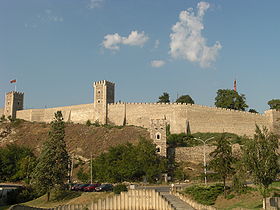Macedonian Police On Alert for Fortress Violence

By Sinisa Jakov Marusic
Security has been increased around Skopje’s old fortress amid fears of renewed ethnic violence at the weekend between Macedonian and Albanian extremists
After calls for new gatherings this weekend at the fortress appeared on the networking site Facebook, Macedonia’s police minister, Gordana Jankulovska, warned that police “will be harsh towards those who intend to make trouble and stir up violence”.
Eight people were injured when clashes erupted last Sunday between ethnic Albanians opposed to the controversial building of a museum in the fortress, and Macedonians who said they came to defend the construction site.
The museum lies on the site of a demolished medieval church, and some Albanian Muslims fear it will at some stage become an active church, in an area of the city that they see as their own.
The police ministry said it had filed charges against 60 people identified as participants in last week’s clashes.
Artan Grubi, head of the ethnic Albanian NGO “Razbudi se (Wake Up)”, which was involved in last week’s clashes, on Friday urged “all to retrain from further protests” at the fortress.
“Wake Up and out partner organizations do not plan protests this weekend. We call on Albanians and other citizens not to be manipulated and remain calm,” the NGO said in a statement.
Macedonia’s Vice Prime Minister, Abdulakim Ademi, an ethnic Albanian, joined calls for restraint. “I appeal to everyone, especially to young people, not to succumb to provocation and not to let themselves be manipulated,” he said.
Albanians make up about one-quarter of Macedonia’s population.
